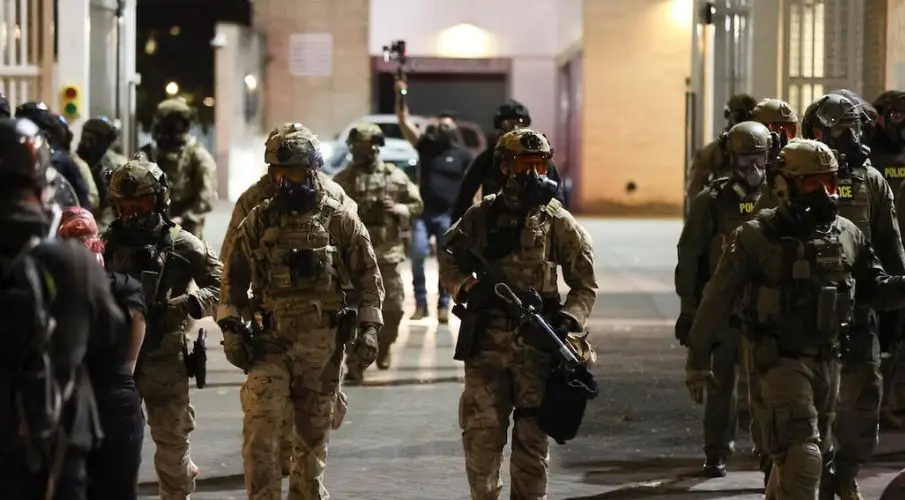A federal judge has put an end to the grand production: Karin Immergut, Case No. 3:25-cv-01756, U.S. District Court for the District of Oregon, temporarily blocked the Trump administration’s planned federalization of the Oregon National Guard in Portland. Her reasoning is disarmingly simple: the protests were small and largely uneventful, and a military deployment would damage Oregon’s sovereignty. America, she writes, is “a nation of constitutional law, not of martial law.” In other words: rhetoric does not replace a factual basis.

Order:
For the reasons stated above, this Court grants Plaintiffs’ Motion for Temporary Restraining Order (TRO), ECF 6, and temporarily enjoins Defendants’ September 28, 2025 memorandum ordering the federalization and deployment of Oregon National Guard service members to Portland. The TRO expires in fourteen days, on October 18, 2025, and the parties are ordered to comply with the attached TRO. Defendants’ request to stay or administratively stay the Temporary Restraining Order, see Defendants’ Opposition to Plaintiffs’ Motion for Temporary Restraining Order, ECF 35 at 41, is denied.
So ordered
Dated this 4th day of October, 2025 at 3:40 p.m. Pacific Daylight Time.
Karin J. Immergut
United States District Judge
The plaintiffs were the state and the city - and they delivered what mattered: evidence that the demonstrations at the ICE facility had lately been more than merely limited. That is precisely why the announcement to “federalize” 200 Guard soldiers sounded like a loudspeaker turning up the static. In fact, the protests grew only after the deployment was announced. Police reported two arrests for assault, a large march saw no arrests. At the ICE entrance, federal forces used tear gas and pepper balls, at least six people were arrested, two of them from the MAGA camp. Escalation through announcement - not through the situation. From the White House came the predictable echo: they would prevail on appeal, the deployment was lawful and necessary to protect personnel and buildings. Oregon Attorney General Dan Rayfield responded dryly: Portland is not the president’s “war-ravaged fantasy” - and the National Guard is not a prop for political theater.

The pattern is familiar. As early as 2020, the Trump administration sent hundreds of federal officers to Portland against the wishes of local officials - officially to protect the federal courthouse. The result: nightly clashes, tear gas, rubber bullets, unmarked vans. Later, the DHS inspector general found that while the legal basis generally existed, many officers lacked training and equipment. This year the federal government paid compensation after an ACLU lawsuit over excessive force. In parallel, the larger tableau: threats or deployments also to Los Angeles, Washington, Chicago, Memphis; in L.A., a court declared the mass deployment unlawful, but left a small residual contingent in place for the time being without civil law enforcement powers - the appeal is ongoing. At its core, it all turns on a simple question: when may the executive carry military logic into civil spaces? Immergut’s answer is a stop sign: not with small, mostly peaceful gatherings. Not when the facts do not sustain the narrative. Not when federal power rolls over state sovereignty just to feed a headline.
For Portland, the ruling means above all one thing: disarm the language. No “war,” no “chaos,” no “death and destruction” - but a city block, a dispute over immigration policy, and the duty to show restraint. For Washington it means: bring real evidence or turn around. Until then the line that writes so easily today and weighs so heavily politically applies: boys, you can turn around now. But one question will remain like a peal of thunder: “Who cleans up the parks now?”
Investigative journalism requires courage, conviction – and your support.
Please also strengthen our journalistic fight against right-wing populism and human rights violations. We do not want to finance ourselves through a paywall so that everyone can read our research – regardless of income or origin. Thank you very much!


Ein kleiner Sieg gegen die staatliche Willkür.
Eine mutige Richterin.
Allerdings, spätestens beim Marionetten Supreme Court wird Trump gewonnen. Dafür sorgt er. Die ganzen doch, bis auf3 Richter, alle nach seiner Pfeife.
Sie haben ihm immer mehr Macht und Befugnisse gegeben.
Das wird nicht enden.
Hoffentlich zeigt sich Chicago auch wehrhaft, denn die stehen auch auf Trumps Fantasiekriegsliste.
..und man sah ja, wie alles weiterging